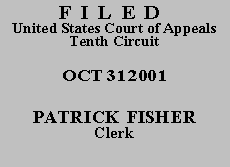

| UNITED STATES OF AMERICA,
Plaintiff-Appellee, v. HECTOR M. ABADIA-ALMONTE, Defendant-Appellant. |
|
Defendant-appellant Hector M. Abadia-Almonte appeals his conviction for the misdemeanor crime of assault by striking, beating or wounding, contrary to 18 U.S.C. § 113(a)(4).(1) Following a bench trial to a magistrate judge, he was found guilty and fined $100.00 plus a $5.00 special assessment. He appealed his conviction to the district court, where his conviction was affirmed. We exercise jurisdiction pursuant to 28 U.S.C. § 1291 and affirm.
On Holloman Air Force Base, New Mexico, at about 1:15 a.m., a witness saw Mr. Abadia-Almonte and his wife walking down the street, arguing. Mr. Abadia-Almonte took a swing at his wife, who fell to the ground. After she got up, he swung several more times, but the witness was not sure if he made contact the second time. A security law enforcement patrolman then stopped the couple and asked if anything was wrong. Both denied any trouble, but the law officer noticed that both of the woman's arms were bruised and red, as if she had just been hit. The woman went to get a coat before going to the law enforcement station. She refused to remove the coat to have her arms photographed by law enforcement personnel. At trial, she testified that Mr. Abadia-Almonte had not hit her or hurt her, and that she had only one bruise on her arm that night and it was not caused by her husband.
On appeal, Mr. Abadia-Almonte challenges the sufficiency of the evidence to convict him. "[W]e reverse on a sufficiency of the evidence claim only if no rational trier of fact could have found the essential elements of the crime beyond a reasonable doubt." United States v. Wilson, 244 F.3d 1208, 1219 (10th Cir.) (quotations and citations omitted), cert. denied, 121 S. Ct. 2619 (2001). Our review of the record is de novo, and we draw all reasonable inferences in the light most favorable to the government. Id. We do not reevaluate the credibility of witnesses or weigh the evidence presented at trial. Id.
Mr. Abadia-Almonte argues that the elements of the crime were not proven because there was no evidence of physical contact with the victim. He relies on the victim's testimony that he did not strike her that night, and on the cross-examination of the prosecution's witnesses. Although the witness who saw the couple fighting in the street stated that he did not know how many times Mr. Abadia-Almonte swung at her and that it was possible she had tripped, he testified that "[h]is arms would have had to have hit her." R. Vol. II, at 11. The law enforcement officer who interviewed the couple on the street corner stated on cross-examination that he did not know how or when the victim's arms became bruised, but he testified that the woman's arms were red, as if "she had just gotten slapped or hit." Id. at 18. The victim admitted that she had refused to have her arms photographed by law enforcement personnel.
The credibility of witnesses and weighing of the evidence presented are squarely within the province of the trial judge. Based on the eyewitness accounts and inferences reasonably drawn from the evidence, a reasonable trier of fact could have found that Mr. Abadia-Almonte had the requisite physical contact with the victim for guilt beyond a reasonable doubt of the misdemeanor crime of assault by striking, beating or wounding. We will not overturn his conviction on appeal.
The judgment of the United States District Court for the District of New Mexico is AFFIRMED.
Entered for the Court
Senior Circuit Judge
*. This order and judgment is not binding precedent, except under the doctrines of law of the case, res judicata, and collateral estoppel. The court generally disfavors the citation of orders and judgments; nevertheless, an order and judgment may be cited under the terms and conditions of 10th Cir. R. 36.3.
1. "Whoever, within the special maritime and territorial jurisdiction of the United States, is guilty of an assault shall be punished as follows: . . . (4) Assault by striking, beating, or wounding, by a fine under this title or imprisonment for not more than six months, or both." 18 U.S.C. § 113(a).